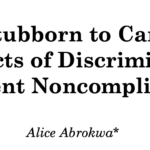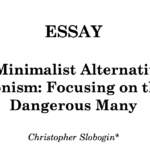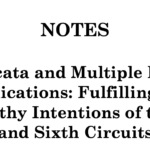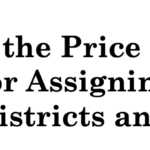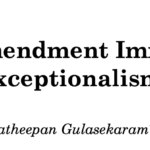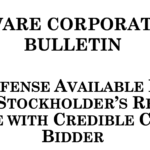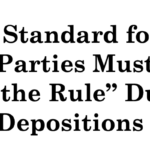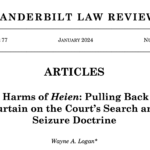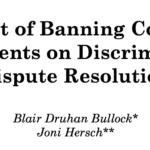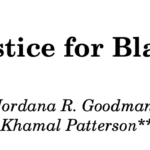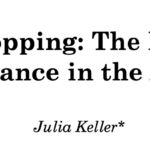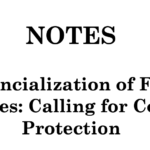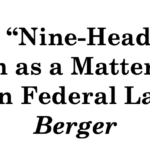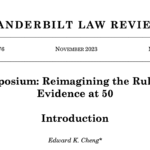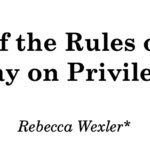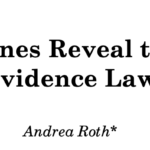Author
Too Stubborn to Care for: The Impacts of Discrimination on Patient Noncompliance
Mar. 20, 2024—Alice Abrokwa | 77 Vand. L. Rev. 461 The role of implicit racial biases in police interactions with people of color has garnered increased public attention and scholarly examination over time, but implicit racial bias in the healthcare context can be as deadly, particularly when it intersects with ableism and sexism. Researchers have found that...
The Minimalist Alternative to Abolitionism: Focusing on the Non-Dangerous Many
Mar. 20, 2024—Christopher Slobogin | 77 Vand. L. Rev. 531 In The Dangerous Few: Taking Seriously Prison Abolition and Its Skeptics, published in the Harvard Law Review, Thomas Frampton proffers four reasons why those who want to abolish prisons should not budge from their position even for offenders who are considered dangerous. This Essay demonstrates why a...
Res Judicata and Multiple Disability Applications: Fulfilling the Praiseworthy Intentions of the Fourth and Sixth Circuits
Mar. 20, 2024—Amber Mae Otto | 77 Vand. L. Rev. 561 In the United States, the application process to receive disability benefits through the Social Security Administration is often a tedious, multistep procedure. The process becomes even more complex if a claimant has filed multiple disability applications covering different time periods. In that circumstance, the question arises...
Efficiency at the Price of Accuracy: The Case for Assigning MDLs to Multiple Districts and Circuits
Mar. 20, 2024—Isaak Elkind | 77 Vand. L. Rev. 599 28 U.S.C. § 1407 allows for the centralization of unique cases into a single forum for pretrial purposes. The product is multidistrict litigation, known colloquially as the “MDL.” While initially conceived as a means of increasing efficiency for only particularly massive, complex litigation, MDLs have become pervasive....
Second Amendment Immigration Exceptionalism
Feb. 8, 2024—Pratheepan Gulasekaram | 77 Vand. L. Rev. En Banc 51 (2024) Recently, a federal district court in United States v. Vazquez- Ramirez upheld the federal criminal prohibition on firearm possession by unlawfully present noncitizens codified in 18 U.S.C. § 922(g)(5). Vazquez-Ramirez is just the latest in a string of post-New York State Rifle & Pistol...
MFW DEFENSE AVAILABLE DESPITE CONTROL STOCKHOLDER’S REFUSAL TO NEGOTIATE WITH CREDIBLE COMPETING BIDDER
Jan. 30, 2024—Robert S. Reder | 77 Vand. L. Rev. En Banc 39 In Smart Local Unions and Councils Pension Fund v. BridgeBio Pharma, Inc., C.A. No. 2021-1030-PAF (Del. Ch. December 29, 2022) (“BridgeBio Pharma”), the Delaware Court of Chancery (“Chancery Court”) examined the negotiation and approval process underlying a control stockholder’s buyout of minority shares via...
A Different Standard for Different Stages: Why Parties Must Be Allowed to “Invoke the Rule” During Oral Depositions
Jan. 30, 2024—Morgan Scott | 77 Vand. L. Rev. En Banc 1 Two attorneys from the same law firm are representing plaintiffs in two whistleblower qui tam lawsuits against different pharmaceutical companies. One suit has been going on for years and is finally at the trial stage; the other will likely settle after depositions are complete. Attorney...
The Harms of Heien: Pulling Back the Curtain on the Court’s Search and Seizure Doctrine
Jan. 26, 2024—Wayne A. Logan | 77 Vand. L. Rev. 1 In Heien v. North Carolina, the Supreme Court held that individuals can be seized on the basis of reasonable police mistakes of law. In an opinion authored by Chief Justice Roberts, the eight-Justice majority held that the Fourth Amendment’s prohibition of “unreasonable” seizures does not bar...
The Impact of Banning Confidential Settlements on Discrimination Dispute Resolution
Jan. 26, 2024—Blair Druhan Bullock & Joni Hersch | 77 Vand. L. Rev. 51 The #MeToo movement exposed how workplace harassment plagues employment in the United States. Several states responded by passing legislation aimed at curbing harassment and employment discrimination in the workplace. One of the most common legislative efforts was to ban confidentiality provisions in certain...
Access to Justice for Black Inventors
Jan. 26, 2024—Jordana R. Goodman & Khamal Patterson | 77 Vand. L. Rev. 109 To receive a patent, an inventor must meet certain inventive and procedural standards. Their invention must be novel, nonobvious, and written in such a way that any person skilled in the inventive subject can make and use the invention without undue experimentation. This...
Eavesdropping: The Forgotten Public Nuisance in the Age of Alexa
Jan. 26, 2024—Julia Keller | 77 Vand. L. Rev. 169 Always-listening devices have sparked new concerns about privacy while evading regulation, but a potential solution has existed for hundreds of years: public nuisance. Public nuisance has been stretched to serve as a basis of liability for some of the most prominent cases of modern mass-tort litigation, such...
The Financialization of Frequent Flyer Miles: Calling for Consumer Protection
Jan. 26, 2024—Ari Goldfine | 77 Vand. L. Rev. 233 Airlines’ frequent flyer programs operate more like a monetary system, with points as a form of currency, than a typical discount or rewards plan. In fact, airlines’ power over points is even more extensive than that of a central bank over currency—beyond simply determining how many points...
Avoiding a “Nine-Headed Hydra”: Intervention as a Matter of Right by Legislators in Federal Lawsuits After Berger
Jan. 26, 2024—Taylor Lawing | 77 Vand. L. Rev. 275 Heightened political polarization across the United States has resulted in the increased use of Rule 24(a) intervention as a matter of right by elected legislators in federal litigation concerning state law. Because states differ in their approaches to intervention, with only some states expressly granting intervention in...
Introduction
Nov. 27, 2023—Edward K. Cheng | 76 Vand L. Rev. 1603 Prior to the eighteenth century, cartographers would often fill uncharted areas of maps with sea monsters, other artwork, or even rank speculation—a phenomenon labeled “horror vacui,” or fear of empty spaces. For example, in Paolo Forlani’s world map of 1565, a yet- to-be-discovered southern continent was...
Ignorance of the Rules of Omission: An Essay on Privilege Law
Nov. 27, 2023—Rebecca Wexler | 76 Vand. L. Rev. 1609 Alton Logan spent twenty-six years in prison for a murder he did not commit, sleeping with a homemade metal shank under his pillow for protection. Meanwhile, attorney Dale Coventry kept the evidence that would ultimately exonerate Logan—another man’s confession—in a box beneath his bed. Coventry kept the...
How Machines Reveal the Gaps in Evidence Law
Nov. 27, 2023—Andrea Roth | 76 Vand. L. Rev. 1631 This Symposium asks participants to reimagine the Federal Rules of Evidence on the fiftieth anniversary of their effective date. As part of that conversation, this short Essay argues that the Rules of Evidence contain critical gaps in terms of empowering litigants to meaningfully challenge the credibility of...
